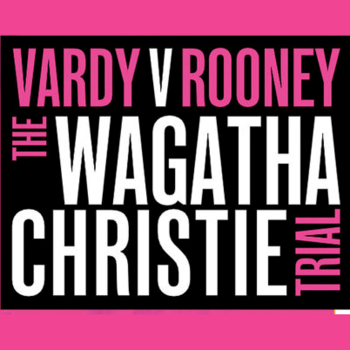The company reportedly acting for Rebekah Vardy has registered WAGATHA CHRISTIE as a trade mark in the UK for a range of goods and services, including “preparation of entertainment programmes for broadcasting”, “production of television programs for broadcast on mobile devices”, and entertainment services relating to “fashion” and “fashion shows” in class 41.
A UK trade mark registration enables the owner of the registration to prevent third party use of an identical or similar trade mark in the UK, for identical or similar goods and services to those claimed in the registration, where there is a likelihood of consumer confusion.
The producers of the play, which is an adaptation of the verbatim court record, are using the following terms and logo:
'Vardy V Rooney: The Wagatha Christie Trial'
'The Wagatha Christie Trial'
On the face of it there is a risk that the owner of the UK trade mark registration WAGATHA CHRISTIE could succeed in an infringement claim against the producers of the show, on the basis that they are using highly similar trade marks in relation to similar services as those claimed in the registration and there is a likelihood of consumer confusion, which includes a likelihood that consumers will associate the use with the owner of the trade mark registration.
There is a defence to trade mark infringement if use is descriptive, so potentially the producers of the play could seek to argue that in this instance they are using the term to refer to the content of the play, rather than an indication of commercial origin. The term WAGATHA CHRISTIE was used significantly by media in reference to the trial, and the play is an adaptation of the verbatim court record, so this may be a route that the producers could seek to take in order to defend their use.
In certain circumstances, it is also possible for a third party to attack a registration relied upon in an infringement claim, if they are in a position to prove that they have acquired rights to identical or similar trade marks, which pre-date the registration, via their own use in the UK. The play itself debuted in the West End on 15 November 2022, but the UK trade mark registration was filed on 22 August 2022 and is protected as of that date, so the producers may not be in a position to pursue this option.
Given the context of the use of WAGATHA CHRISTIE in the title of the play, and the commercial nature of the play, there is on the face of it a risk that the public may believe that the play is produced by the owners of the WAGATHA CHRISTIE trade mark registration, or with their consent or endorsement.
It is interesting to note that the owners of the WAGATHA CHRISTIE trade mark registration did not claim “entertainment services” more broadly in class 41. Generally, when we act for clients in the entertainment sector, we would seek to include broad terms that would cover, amongst other activities, “production of plays and performances” in this instance for example, in order to future proof against our clients’ expansion into other areas. That would have put the owners of the registration in a stronger position to take issue with the producers’ use, as it would relate to identical services.
It will be interesting to see how this develops given the various arguments available to both parties and the significant knowledge amongst the public of WAGATHA CHRISTIE as a term referencing the trial.




